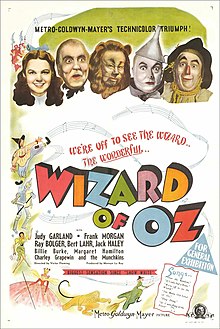
Back ساحر أوز (فيلم 1939) Arabic ساحر اوز (فيلم 1939) ARZ Oz ölkəsinin cadugəri (film) AZ Магьосникът от Оз Bulgarian দ্য উইজার্ড অব অজ (১৯৩৯-এর চলচ্চিত্র) Bengali/Bangla Čarobnjak iz Oza (1939) BS El màgic d'Oz (pel·lícula) Catalan The Wizard of Oz CY Troldmanden fra Oz (film) Danish Der Zauberer von Oz (1939) German
| The Wizard of Oz | |
|---|---|
 Theatrical release poster | |
| Directed by | Victor Fleming |
| Screenplay by | |
| Adaptation by |
|
| Based on | The Wonderful Wizard of Oz by L. Frank Baum |
| Produced by | Mervyn LeRoy |
| Starring | |
| Cinematography | Harold Rosson |
| Edited by | Blanche Sewell |
| Music by | Herbert Stothart |
Production company | |
| Distributed by | Loew's Incorporated[1] |
Release dates |
|
Running time | 102 minutes[2] |
| Country | United States |
| Language | English |
| Budget | $2.8 million[3][4] |
| Box office | $29.7 million |
The Wizard of Oz is a 1939 American musical fantasy film produced by Metro-Goldwyn-Mayer (MGM). Based on the 1900 novel The Wonderful Wizard of Oz by L. Frank Baum, it was primarily directed by Victor Fleming, who left production to take over the troubled Gone with the Wind. It stars Judy Garland, Frank Morgan, Ray Bolger, Bert Lahr, Jack Haley, Billie Burke, and Margaret Hamilton. Noel Langley, Florence Ryerson, and Edgar Allan Woolf received credit for the screenplay, while others made uncredited contributions. The music was composed by Harold Arlen and adapted by Herbert Stothart, with lyrics by Edgar "Yip" Harburg.
The Wizard of Oz is celebrated for its use of Technicolor, fantasy storytelling, musical score, and memorable characters.[5] It was a critical success and was nominated for five Academy Awards, including Best Picture, winning Best Original Song for "Over the Rainbow" and Best Original Score for Stothart; an Academy Juvenile Award was presented to Judy Garland.[6] It was on a preliminary list of submissions from the studios for an Academy Award for Cinematography (Color) but was not nominated.[7] While the film was sufficiently popular at the box office, it failed to make a profit until its 1949 re-release, earning only $3 million on a $2.7 million budget, making it MGM's most expensive production at the time.[3][8][9]
The 1956 television broadcast premiere of the film on CBS reintroduced the film to the public. According to the U.S. Library of Congress, it is the most seen film in movie history.[10][11] In 1989, it was selected by the Library of Congress as one of the first 25 films for preservation in the United States National Film Registry for being "culturally, historically, or aesthetically significant";[12][13] it is also one of the few films on UNESCO's Memory of the World Register.[14] The film was ranked second in Variety's inaugural 100 Greatest Movies of All Time list published in 2022.[15] It was among the top ten in the 2005 British Film Institute (BFI) list of 50 Films to be Seen by the Age of 14 and is on the BFI's updated list of 50 Films to be Seen by the Age of 15 released in May 2020.[16] The Wizard of Oz has become the source of many quotes referenced in contemporary popular culture. The film frequently ranks on critics' lists of the greatest films of all time and is the most commercially successful adaptation of Baum's work.[10][17]
- ^ The Wizard of Oz at the AFI Catalog of Feature Films
- ^ "The Wizard Of Oz" (Cinema). BBFC. British Board of Film Classification. Retrieved September 2, 2021.
- ^ a b The Eddie Mannix Ledger, Los Angeles: Margaret Herrick Library, Center for Motion Picture Study.
- ^ "The Wizard of Oz (1939)". Box Office Mojo. Archived from the original on October 25, 2019. Retrieved October 25, 2019.
- ^ "The Technicolor world of Oz". americanhistory.si.edu. June 7, 2010. Retrieved October 24, 2024.
- ^ CineVue (November 9, 2022). "The enduring legacy of The Wizard of Oz". CineVue. Retrieved October 24, 2024.
- ^ "Academy Awards database: 12th award show search results". Academy of Motion Picture Arts and Sciences.
- ^ Nugent, Frank S. (August 18, 1939). "The Screen in Review; 'The Wizard of Oz,' Produced by the Wizards of Hollywood, Works Its Magic on the Capitol's Screen – March of Time Features New York at the Music Hall at the Palace". Retrieved August 15, 2014.
- ^ King, Susan (March 11, 2013). "How did 'Wizard of Oz' fare on its 1939 release?". Los Angeles Times. Archived from the original on November 14, 2020. Retrieved April 24, 2015.
- ^ a b Fricke, John (1989). The Wizard of Oz: The Official 50th Anniversary Pictorial History. New York: Warner Books. ISBN 978-0-446-51446-0.
- ^ "To See The Wizard Oz on Stage and Film". Library of Congress. December 15, 2010. Archived from the original on September 29, 2018. Retrieved April 16, 2011.
- ^ "Complete National Recording Registry Listing – National Recording Preservation Board – Library of Congress". Library of Congress. Archived from the original on January 7, 2017. Retrieved March 18, 2018.
- ^ "Film Registry Picks First 25 Movies". Los Angeles Times. Washington, D.C. September 19, 1989. Archived from the original on May 5, 2020. Retrieved April 22, 2020.
- ^ "The Wizard of Oz (Victor Fleming 1939), produced by Metro-Goldwyn-Mayer". UNESCO Memory of the World Programme. Archived from the original on August 5, 2009. Retrieved September 7, 2009.
- ^ Debruge, Peter; Gleiberman, Owen; Kennedy, Lisa; Kiang, Jessica; Laffly, Tomris; Lodge, Guy; Nicholson, Amy (December 21, 2022). "The 100 Greatest Movies of All Time". Variety. Retrieved December 23, 2022.
- ^ "50 films to see by age 15". British Film Institute. May 6, 2020. Archived from the original on May 28, 2020. Retrieved June 1, 2020.
- ^ "AFI's 100 Years...100 Movies". www.afi.com. Archived from the original on May 15, 2016. Retrieved August 9, 2017.